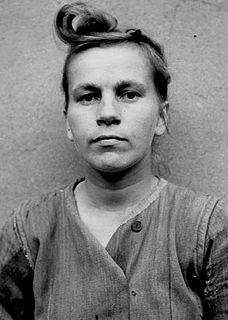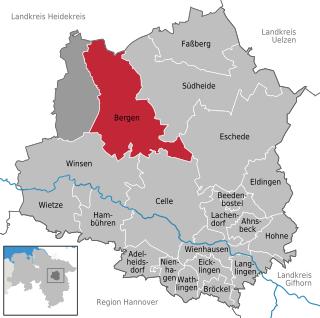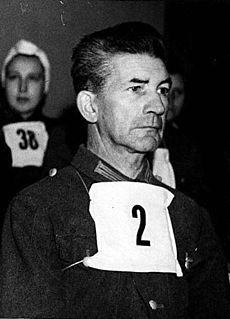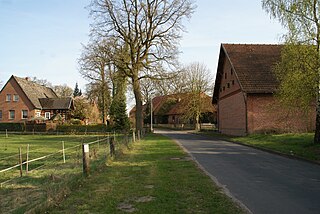
Andrew Edward Bertie Matthews (died 1995), was one of the St Mary's medical students who volunteered to assist at Bergen-Belsen concentration camp in 1945. [1] [2] [3] [4]

Andrew Edward Bertie Matthews (died 1995), was one of the St Mary's medical students who volunteered to assist at Bergen-Belsen concentration camp in 1945. [1] [2] [3] [4]

Bergen-Belsen[ˈbɛʁɡn̩.bɛlsn̩], or Belsen, was a Nazi concentration camp in what is today Lower Saxony in northern Germany, southwest of the town of Bergen near Celle. Originally established as a prisoner of war camp, in 1943, parts of it became a concentration camp. Initially this was an "exchange camp", where Jewish hostages were held with the intention of exchanging them for German prisoners of war held overseas. The camp was later expanded to accommodate Jews from other concentration camps.

Irma Ida Ilse Grese was an SS guard at the Nazi concentration camps of Ravensbrück and Auschwitz, and served as warden of the women's section of Bergen-Belsen.

Elisabeth Volkenrath was a German supervisor at several Nazi concentration camps during World War II.

The Belsen trial was one of several trials that the Allied occupation forces conducted of former officials and functionaries of Nazi Germany after the end of World War II.

Herta Bothe was a German concentration camp guard during World War II. She was imprisoned for war crimes after the capitulation of Nazi Germany, and was subsequently released early from prison on 22 December 1951 as an act of leniency by the British government.

Juana Bormann was an East Prussian-born prison guard at several Nazi concentration camps, from 1938 and was executed as a war criminal at Hamelin, Lower Saxony, Germany, after a court trial in 1945.

Josef Kramer was the Commandant of Auschwitz-Birkenau and of the Bergen-Belsen concentration camp. Dubbed The Beast of Belsen by camp inmates, he was a notorious German Nazi war criminal, directly responsible for the deaths of thousands of people. He was detained by the British Army after the Second World War, convicted of war crimes and hanged on the gallows in Hamelin prison by British executioner Albert Pierrepoint.

Bergen-Belsen displaced persons camp was a displaced persons (DP) camp for refugees after World War II, in Lower Saxony in northwestern Germany, southwest of the town of Bergen near Celle. It was in operation from the summer of 1945 until September 1950. For a time, Belsen DP camp was the largest Jewish DP camp in Germany and the only one in the British occupation zone with an exclusively Jewish population. The camp was under British authority and overseen by the United Nations Relief and Rehabilitation Administration (UNRRA) with camp directors that included Simon Bloomberg. Today, the camp is a Bundeswehr barracks, having been a British Army base until 2015.
Bergen-Belsen may refer to:

Bergen is a town in the north of Celle district on the Lüneburg Heath, in Lower Saxony, Germany. Administratively it acts as a municipal borough divided into 12 subordinate parishes based on the town and its surrounding villages: Becklingen, Belsen, Bergen, Bleckmar, Diesten, Dohnsen, Eversen, Hagen, Hassel, Offen, Sülze and Wardböhmen. Bergen-Belsen concentration camp was located in the area of Belsen.

Fritz Klein was a German Nazi doctor and war criminal, hanged for his role in atrocities at Bergen-Belsen concentration camp during the Holocaust.

Hambühren is a municipality in the district of Celle, in Lower Saxony, Germany. It is situated approximately 7 km (4.3 mi) west of Celle.
Stalag XI-C Bergen-Belsen, initially called Stalag 311, was a German Army prisoner-of-war camp located near the town of Bergen in Lower Saxony.

Felice Rahel Schragenheim was a Jewish resistance fighter during World War II. She is known for her tragic love story with Lilly Wust and death during a march from Gross-Rosen concentration camp to Bergen-Belsen concentration camp in Germany or, not later than, March 1945 in Bergen-Belsen.

Belsen is a village within the German borough of Bergen in the northern part of Celle district on the Lüneburg Heath in Lower Saxony. The village, whose original site lies about 3 kilometres (1.9 mi) southwest of Bergen, has 331 inhabitants (as at: 31 December 2000). The Belsen concentration camp was named after it. Today Belsen is dominated by the former British Army camp of Hohne on the edge of the NATO firing ranges.

Anneliese Kohlmann was a German SS camp guard within the Nazi concentration camp system during World War II, notably, at the Neuengamme concentration camp established by the SS in Hamburg, Germany; and at Bergen-Belsen. She was tried for war crimes at the Belsen Trial in Lüneburg in 1945.

Erich Zoddel was a prisoner functionary at the Bergen-Belsen concentration camp. In 1941, Zoddel was sentenced to a year in prison for theft before being transferred to Sachsenhausen concentration camp in 1942. He worked as a forced laborer in the Heinkel factory in Oranienburg until October 1943. In November 1943, after a brief stay at Buchenwald concentration camp, he was taken to Mittelbau-Dora concentration camp. On 27 March 1944, Zoddel and 1,000 other prisoners from Mittelbau-Dora arrived at Bergen-Belsen. By January 1945, Zoddel had risen in the ranks to a camp division. Two days after the liberation of Bergen-Belsen by the British army on 15 April 1945, Zoddel killed a female detainee, a crime for which he was sentenced to death by a British military court in Celle on 31 August 1945. On 17 November 1945, Zoddel was sentenced to life imprisonment in a second trial for his actions at Bergen-Belsen. His execution was carried out later that month in Wolfenbüttel by guillotine.
Arnold Peter Meiklejohn was a lecturer in nutrition at the University of Edinburgh who in 1945, was given the responsibility of administering the starvation diet to the severely malnourished and dying inmates at Bergen-Belsen concentration camp shortly after its liberation by British troops. In this role, he supervised just under 100 London volunteer medical students who were sent to the camp to assist him, at the request of Brigadier Hugh Glyn-Hughes and the war office.

In early April 1945, the British Red Cross and the War Office, at the request of the British Army, called for 100 volunteers from among medical students at London hospitals to assist in feeding starving Dutch children who had been liberated from German occupation by advancing Allied forces. However, in the meantime, British troops had liberated Bergen-Belsen concentration camp and the students were diverted there on the day they were due to travel to the Netherlands. The students had previously spent most of the Second World War at school and in medical training.

Michael John Hargrave was a British general practitioner in Wootton Bassett, Wiltshire, who in 1945 assisted at Bergen-Belsen concentration camp when he volunteered as a medical student from Westminster Hospital at the age of 21.
| This United Kingdom biographical article related to medicine is a stub. You can help Wikipedia by expanding it. |